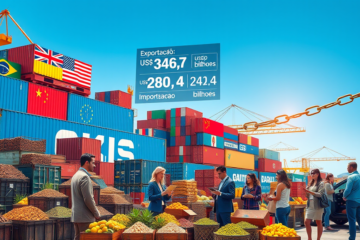50% Tariffs on Brazilian Products in Force
Commercial Tariffs have been a central theme in relations between Brazil and the United States, especially with the implementation of 50% tariffs on Brazilian products starting August 1.
This measure, which aims to correct the trade deficit that Brazil has maintained with the United States since 2009, raises questions about sovereignty and international trade.
The article will address the details of this new tariff policy, the discussions surrounding the emergency declaration, and the role of the Brazilian senators' committee in the United States.
Additionally, the reaction of Democratic senators and the implications for bilateral relations will be explored.
50 percent tariffs take effect August 1
The tariffs of 50% on Brazilian products will come into force from August 1st.
This measure is mainly justified by the continuous trade deficit that Brazil has had with the USA since 2009.
This mismatch has raised concerns about the economic sustainability of trade between the two countries.
As a result, the aim is to implement tariffs to balance this balance, even if temporarily.
The decision aims to mitigate the negative impacts on the local economy and ensure commercial sovereignty.
- Mineral fuels
- Iron
- Steel
- Machines
- Meats
This list of impacted products reflects critical sectors facing significant challenges due to the new tariffs.
For more details on the decision and its implications, please consult the page on US tariffs.
With these tariffs, the Brazilian market needs to seek adaptation strategies to minimize the consequences for the national economy.
Discussion on declaring an emergency and seeking a legal basis
The US government is preparing to implement emergency decree justifying the application of 50% tariffs on imported Brazilian products from August 1st.
This strategy aims to correct the existing trade deficit with Brazil since 2009. The authorities seek a legal authority adequate to support this measure.
Under the Donald Trump administration, efforts are being made to establish a solid legal basis to legitimize the action, with the hope of ensuring its compliance with international regulations, as reported in a reliable source (Infomoney).
However, the process faces significant challenges.
Politically, there is resistance both internally and externally, with Democratic senators vehemently criticizing the measure, accusing it of abuse of power.
Influential personalities highlighted:
“Example of official speech.”
Legally, the search for a robust and indisputable justification for such tariffs poses considerable challenges, requiring a delicate balance between national interests and global guidelines.
Thus, an intricate game of negotiation and political strategy emerges as a critical element for the plan's viability.
Reaffirmation of Brazilian sovereignty and the independence of the Judiciary
A sovereignty of Brazil manifests itself in the country's ability to make autonomous decisions in its domestic and foreign policy, without interference from foreign powers.
The recent imposition of 50% tariffs on Brazilian products by the United States, effective August 1, represents a direct challenge to this sovereignty.
The Brazilian government reacted, reaffirming that it will not accept being under the tutelage of any nation, as emphasized by the president Luiz Inácio Lula da Silva in a vigorous response note.
More details on this development, including the official Brazilian response, are available at Folha website.
A independence of the judiciary is crucial in this context, ensuring that judicial decisions are not influenced by external or internal pressures.
Minister Alexandre de Moraes, when citing Lincoln, defended the integrity and impartiality of the Brazilian judicial system, clearly illustrating this principle.
As reported by People's Gazette, this reaffirms Brazil's commitment to justice and legality.
The continued pursuit of negotiations with the United States demonstrates that Brazil is willing to find diplomatic solutions without compromising its fundamental principles.
Mission of Brazilian senators in Washington
A relevant committee of Brazilian senators is in Washington to negotiate 50% tariffs imposed by the US on Brazilian products, a measure initiated to rebalance the trade deficit since 2009. Composed of key figures who represent Brazil's commercial interests, the commission has the challenge of dialoguing with the US government, seeking a diplomatic solution.
A importance of the mission is emphasized due to the need to avoid greater economic losses.
| Challenge | Strategy |
|---|---|
| Regulatory differences | Align standards |
| Short deadlines | Intensive schedule |
| Political pressure | Bipartisan dialogue |
| Public opinion | Information campaign |
With negotiations intensifying, senators need to reconcile interests and present practical solutions that benefit both countries.
The path to the future involves not just diplomatic tactics, but also the strengthening of commercial cooperation, maintaining Brazilian sovereignty.
The senators' meeting is already crucial, but continued negotiations will be essential to mitigate the impacts of sanctions and promote a fairer trade partnership.
Democratic Senators' Letter Challenges Tariffs
You US Democratic Senators expressed strong opposition to the 50% tariffs imposed on Brazilian products.
They argue that this measure represents a “clear abuse of power” on the part of the then president. Donald Trump, using the economic power of the United States in an excessive and compromising manner.
This action is seen as an attempt to unfairly interfere in economic and diplomatic processes., as described in letter of objection.
The tariffs are justified by the growing trade deficit between Brazil and the US since 2009, but senators point out that the solution proposed by Trump exacerbates diplomatic tensions.
Furthermore, criticism focuses on how such tariffs could worsen the domestic economic situation, affecting the lives of Americans.
The political impact is significant, demonstrating growing dissatisfaction with Trump's foreign policy, while discussions about Brazil's sovereignty and the independence of its judiciary intensify, underscoring the country's resistance to giving in to external commercial pressures.
This highlights the complex web of interdependencies and rivalries on the global stage, where foreign policy decisions reverberate across multiple fronts.
“
Request for investigation into Brazilian barriers to American exporters
The request for an investigation into Brazilian trade practices that restrict access for American exporters comes amid growing trade tensions between Brazil and the United States.
Initiated under Section 301 of the Trade Act, the investigation seeks to identify whether Brazilian policies are “unreasonable or discriminatory” and negatively impact American interests.
This action reflects concerns that trade barriers are favoring market practices unfavorable to the United States.
- Discrepancies in import tariffs applied by Brazil.
- Non-tariff barriers that affect the competitiveness of American products in the Brazilian market.
- Internal subsidies that offer unfair advantages to national producers.
- Administrative restrictions that delay and hinder access to American products.
- Environmental impact of business practices, including concerns about deforestation.
Relevant for bilateral trade, the research highlights the importance of clear and fair rules for both countries.
It can promote more transparent and equitable negotiations, thus strengthening Brazil-US relations.
To the point out areas for improvement, contributes not only to a more stable business relationship, but also enhances mutual economic development.
In summary, the new trade tariffs reflect tensions in relations between Brazil and the United States, bringing to the fore issues of sovereignty and trade.
The outcome of these negotiations and the political reactions will determine the future of this complex dynamic.



0 Comments